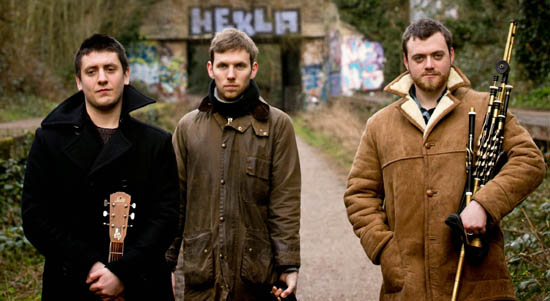|
The London-based Teyr take their name from the Cornish language for 'three.' The band -- James Gavin (guitar, violin), Dominic Henderson (uilleann pipes, whistles), and Tommie Black-Roff (accordion) – have been seasoned through extensive session playing. Teyr make no bones about their influences, which include the Basque traditions, as well as those from Cornwall, England, Ireland, and Scotland. No doubt there are more tributaries flowing in and out amongst the trio, whose symbol is that of a flying (sycamore) seed, represented beautifully on the cover of the CD by Cornwall artist Billy Wynter.
Indeed, there is an artistic bent to Teyr's sound, and a solid, earthy, straightforward-getting-the-business-done that elevates the trio's intricate arrangements. Opener 'Reeds & Fipple' beautifully moves from an opening reel, then downshifts to a slow air: it is a nice upending of expectations that sets the tone for the album. The Cornish song 'Banks of the Newfoundland' opens with the rippling of accordion, evoking the sea, and the song itself is heartily sung and bolstered by the onrush of uilleann piping after the chorus. 'The Badge' shows the band interlocking their sound, first around whistle, guitar, and accordion, and then latterly with the introduction of pipes. Gentle, then driving; Gavin, Henderson, and Black-Roff masterfully build the track. The lengthy 'GM' plunks one down in the midst of an extended set, derived from Teyr's London sessions. Closing tune 'Dean's Banjo' shows the trio's wonderful use of dynamics, and surprisingly the tune quickly reaches a full-stop. Breathing room is given for the accordion to then pick up the music again, and gradually Teyr race towards its merry end.
'The Hosting of the Sidhe' is an unusual song. Teyr have crafted this track from the poetry of W.B. Yeats. In addition, the music is just stunning: there is something eerie (and airy) about the construction of the tune. It features plenty of bellows action, and there is a mysterious darkness cast throughout; by the end, the tune spirals upwards, as if the fair folk are taking flight. As opposed to the supernatural, a glimpse of the meaner side of human nature is detailed in the Scottish murder ballad 'False Lady' (also known as 'Young Hunting,' or 'Earl Henry'). Teyr have given this traditional tale an interesting structure. The song begins with the band playing in tandem, but the instruments slowly drop away as the trio sings together. Teyr reconvene and build the music to bring the song to its conclusion, where the narrator manages to escape the woman's deadly grasp.
More poetry is utilized on the intriguing 'Nothing Grows,' based on words written by Stephen Muldoon. “Apple grows on apple tree/Mighty oak from bird dropped seed/Chestnut, conker, king of nine/Swinging pendulum piece of twine/Nothing grows where nothings been/Nothing grows where nothings been” runs one stanza. Here, Teyr evince a modernist stance, with their instruments whirling around a repetitious melodic line, and the combination with the text is hugely affecting.
Far From The Tree is a stunningly crafted release, the kind of music that builds on tradition with such care that it feels perfect. The group Teyr is essential listening. – Lee Blackstone
|
